|
I personally believe that life purpose is something we remember from a spiritual perspective rather than something we create. Of course, this depends on a person’s beliefs, and their viewpoint may differ. For me, I remembered my purpose when I discovered my passion—helping and motivating others to reach their full potential. I believe my purpose was already determined before I was born, but it remained dormant or was gradually unfolding as I matured. When the time was right, I became aware of it, understood it, and eventually began embodying it. This process has been gradual, but now my purpose is very clear to me: to learn, to experience, and to serve others. I believe there was a reason for me to come back to Earth, meaning my purpose was already determined before birth. Once my soul defined this purpose, it had to manifest it into reality—into a physical form—so I was born with this purpose written inside me. But here’s the key: It’s not that you are looking for your purpose. Your purpose has always been guiding you. We often think of purpose as something we must actively seek, as if it’s hidden somewhere outside of us. But in reality, our purpose is always present, subtly directing us through our experiences, passions, and even challenges. The process of life itself is designed to help us remember and align with it. An Analogy: The Meeting of Forgotten Purpose Imagine we all have a condition—not Alzheimer’s, but a type of forgetfulness where we remember bits and pieces, just not everything clearly. We find ourselves in a meeting but don’t remember why we’re there. The entire time, we’re trying to recall the purpose of the meeting and our role in it. We try different things to spark our memory, hoping to find something that feels right, but nothing fully clicks. Since our memory is unreliable, we rely on feelings and intuition. Deep down, we sense we’re in the right place—we planned to be here—but we’re not truly fulfilling our purpose because we don’t fully remember what we came to do. Others in the meeting are in the same situation. Some might remember more than others. Together, we start piecing together clues, helping each other recover fragments of our memory. As more people remember, the purpose of the meeting becomes clearer, and soon, things start moving in the right direction. The key to feeling at peace isn’t just remembering the purpose—it’s fulfilling it. Once we recall why we’re here, the anxiety and frustration fade, giving us clarity. Instead of spending all our time just trying to remember, we can focus on doing what we came here to do—contributing, making a difference, and even helping others remember their purpose too. For Spiritual and Non-Spiritual Perspectives For those on a spiritual path, the journey of purpose looks like this: Higher purpose → Manifested → Living and remembering our higher purpose → Fulfilling our purpose. For those who do not hold spiritual beliefs, purpose can still be deeply meaningful: Nothing → Something → Lost/Confused → Finding a purpose → Fulfillment. Even without believing in a higher purpose, one can still enter “the meeting” with a reason—to learn, to contribute, and to experience life. There’s nothing wrong with not believing in spiritual destiny. The key is long-lasting fulfillment, rather than chasing fleeting goals. Why Does Purpose Seem to Change? Why is it that sometimes we feel certain about pursuing something, only to realize later that it no longer feels right? Because your goal was never meant to last forever. It may have even been aligned with your larger purpose, but only as a fraction of what you were meant to accomplish. The universe guides you into doing something, then out of it, so you can continue fulfilling your greater purpose. Mind vs. Soul: The Illusion of Purpose Purpose exists for the mind at the human level—it needs direction to continue its journey. But the soul is already living its purpose, patiently progressing according to a greater plan. The struggle comes because the mind, limited by ego and human perception, cannot fully comprehend the soul’s deeper purpose. In many cases, the mind’s pursuit of purpose originates from the ego. The ego seeks identity, validation, and significance. It wants to feel special, to achieve something, to leave a mark. This is why people sometimes chase goals that later feel empty—because they were ego-driven rather than soul-aligned. But when the mind finally recognizes the soul’s true purpose, the two align, and purpose is naturally fulfilled. In other words, the moment you realize your true purpose, you are already living it. Whether you feel like you’ve accomplished or fulfilled your purpose is simply the mind trying to measure and understand something that was always in motion. A Lesson from 50 First Dates In 50 First Dates, Adam Sandler’s character, Henry, can be seen as a representation of God/Spirit Guide or an awakened friend trying to help someone (Lucy) recover her memory—just like how an awakened soul helps those who are still “asleep” remember their true purpose. Henry knows that Lucy will likely forget everything by the next morning, yet he has no expectations or frustration. Instead, he patiently works with her, bringing joy into her life each day. He meets her where she is, without force or pressure. Lucy, despite her memory loss, still experiences happiness in her day-to-day life. And Henry, through his unwavering commitment, lives with a sense of purpose every day. This mirrors the journey of awakening—some people forget who they are and why they’re here, but those who remember can gently guide them, not by forcing remembrance, but by being present, patient, and leading with love. In the end, whether one remembers or not, the key is to live with joy and purpose in each moment. “The world exists because of you, not the other way around.” - FeelaSoulphy
0 Comments
What if God experiences life through us, and through our ability to love and forgive, we experience God? This profound idea redefines compassion, empathy, and forgiveness as not just moral virtues but spiritual practices that bring us closer to the divine. By embodying these qualities, we dissolve the illusion of separateness and open ourselves to the truth of oneness. God’s Infinite Experience If God is infinite and all-encompassing, then every experience—joy, sorrow, love, and pain—flows through God. Imagine God not as a distant observer but as an intimate participant, feeling the world through our eyes, hearts, and actions. This perspective explains the boundless forgiveness and compassion often attributed to God. How could a being that experiences life through all of us condemn? Judgment fades in the presence of deep understanding, and divine compassion becomes the natural response to human imperfection. Compassion: The Gateway to Oneness Compassion, empathy, and forgiveness are often seen as acts of kindness toward others, but they are also pathways to divine connection. When we forgive someone, we see beyond their actions and connect with their humanity. When we empathize, we transcend the boundaries of self and other, recognizing that their pain is not separate from our own. In these moments, we step into the divine flow of oneness. We aren’t just connecting with another person; we’re aligning with the essence of God. Experiencing God Through Action Many seek to understand God through prayer, meditation, or scripture. While these practices are invaluable, there’s another, often overlooked way to experience the divine: by embodying God-like qualities. • Compassion: When we offer compassion to others, we act as vessels of divine love. We create a space where others feel seen, understood, and accepted—just as God does for us. • Forgiveness: Forgiveness isn’t about excusing harm but about freeing ourselves from the chains of resentment. In forgiving, we reflect God’s infinite capacity for understanding. • Empathy: When we feel another’s pain as our own, we dissolve the illusion of separateness and touch the truth of our interconnectedness. By embodying these qualities, we don’t just know God; we experience God within and through us. Barriers to Divine Connection If compassion and forgiveness bring us closer to God, then what happens when we act without them? Judgment, anger, and resentment create a sense of separation—not just between ourselves and others but also between ourselves and the divine. These barriers are illusions, but they feel real because they’re rooted in the ego’s desire to protect its identity. The antidote is simple yet profound: practice compassion, even when it feels difficult. Forgive, even when it feels undeserved. In doing so, we don’t just heal relationships; we also heal the separation within ourselves and reconnect with God’s presence. Living as the Divine To live compassionately is to embody the essence of God. When we approach the world with love, empathy, and forgiveness, we become reflections of the divine. And in those moments, we don’t just sense God—we become one with God. So, the next time you feel compassion for someone, realize that you’re not just being kind; you’re touching the infinite. And when you forgive, remember that you’re stepping into the boundless love that flows through all of creation. By aligning with these divine qualities, we move closer to the truth of oneness—where God is not something we reach for, but something we are. A Call to Action Take a moment today to reflect: where in your life can you offer more compassion or forgiveness? Perhaps it’s toward a loved one, a stranger, or even yourself. Try to embody that divine quality and notice the shift it creates—not just in the world around you, but in your own heart. If this message resonates with you, I’d love to hear your thoughts or experiences. How have you experienced compassion as a spiritual practice? Let’s continue this conversation about oneness and divine connection in the comments below. Have you ever marveled at the intricate processes that sustain life, such as how a single cell divides and proliferates into trillions of specialized cells, forming the complex organism we call the human body? This natural phenomenon is not just a marvel of biology—it may also offer us profound insights into the nature of existence itself. Imagine for a moment that the universe, or God, began as a single, unified consciousness. This consciousness, desiring to know and experience itself in all its infinite possibilities, began a process of self-division. It split into two, then four, then countless individual aspects—much like a single cell proliferating into a multitude of cells, each with its unique role and identity. But just as the cells in our bodies remain connected, working in harmony to sustain the whole, so too are all aspects of this original consciousness still interconnected. What if this proliferation of consciousness was not random, but a deliberate act of creation? Just as a cell divides to contribute to the growth and maintenance of the body, perhaps each aspect of this original consciousness was created to explore a unique facet of existence. Each of us, in our individuality, is an expression of this divine desire to experience life from every possible angle. When we look at the natural world, we see this principle in action everywhere. A single seed grows into a tree, spreading its branches and giving rise to countless leaves, each unique but all connected to the same source. A single fertilized egg divides and differentiates into the vast complexity of a living being. This is nature's way, and it may very well be the way of the cosmos itself. In our bodies, the health of one cell can impact the health of the entire organism. Similarly, in the grand web of existence, the well-being of one individual affects the whole. This interconnectedness is not just a biological truth; it is a spiritual one as well. Just as cells communicate, support, and sometimes even sacrifice themselves for the greater good of the organism, we too are called to recognize our connections to others and to the universe at large. When one cell becomes diseased, it can disrupt the harmony of the body. Likewise, when we act out of alignment with our true nature, it can create discord not just within ourselves but in the world around us. Understanding this connection can lead us to greater compassion, mindfulness, and a deeper sense of responsibility for our actions. The process of cell proliferation offers us a glimpse into the divine blueprint. It shows us that the universe is not a chaotic accident, but a purposeful unfolding of consciousness. Each cell, each being, each experience is part of a larger plan—a cosmic dance in which the One experiences itself as the many. By looking at nature, we can begin to understand our place in this grand design. We are not isolated individuals, but expressions of a unified consciousness that seeks to know itself through us. Our lives, our choices, our very existence is part of this sacred journey. So, the next time you consider the miracle of life, remember that you are part of something much larger than yourself. You are a unique expression of the divine, interconnected with all of creation. Just as cells work together to sustain life, we are all connected in this cosmic exploration, each contributing to the universal experience. Let us honor this connection by living in harmony with one another, recognizing that in doing so, we are fulfilling the very purpose of creation itself: to experience, to grow, and to return, ultimately, to the unity from which we came. - Feelashoulphy If Freewill was given to us by God then it would be the greatest test of all. And Temptation must be Freewill’s closest ally or its evil twin. - Feelasoulphy Once your heart is open you will receive the truth and wisdoms of God/Universe. You will no longer be bounded by the limits of the ego. - Feelasoulphy The devil resides in the past and the future. God is eternally here and now. To be with God is to be in the present. When your mind dwells in the past and imagines the future, you create opportunities for negative thoughts to appear. Only when you remain in the present moment you enjoy the pure presence of your true nature as a divine being. God is always here and now, which is the only true reality he created for us. The past and the future are created by the ego. In order to experience God and experience this life with him and to receive his teachings you must stay in the present. Meditation can be one way to help you achieve this goal. It doesn’t have to be sitting without thoughts. It can be a walk in the nature alone, in the morning when you are awake but before opening your eyes, read a good book, or a long hot shower, etc. Allow thoughts to come in without resisting them and observe them but do not judge them. As long as you don’t attach your emotions to your thoughts you will remain in the present. - FeelaSoulphy Thank you for not giving me what I wanted in those moments because you knew they were not my soul’s desires. Thank you for making me feel disappointed, heart broken, angry, jealous, depressed, embarrassed. Through them you prepare me for what I truly want out of this life! - FeelaSoulphy You are perfect the way you are for what you need to accomplish in this lifetime. There's no other way to be you for all the lessons you need to learn and the missions you need to fulfill. Your experiences are absolutely perfect and they all happen at the perfect timing. There's no one can tell you that you are imperfect because no one knows and will know or understands your soul's purpose in this particular life. To say you are not perfect is to say God's creation is imperfect. Do you believe somehow God has made a mistake? Or perhaps his "mistake" to us has a purpose? Embrace all life experiences including the struggles because that's what we are here for! There are no unfortunate events in life but only experiences and lessons. Enjoy this precious human experience as a spirit on earth! - FeelaSoulphy You: Why me?! God: No worries my child. Whom would you like it to be? You: Ok, why now? God: Now we are talking! Remember what you have asked for? -FeelaSoulphy The devil resides in the past and the future. God is eternally here and now. To be with God is to be in the present. When your mind dwells in the past and imagines the future, you create opportunities for negative thoughts to appear. Only when you remain in the present moment you enjoy the pure presence of your true nature as a divine being. God is always here and now, which is the only true reality he created for us. The past and the future are created by the ego. In order to experience God and experience this life with him and to receive his teachings you must stay in the present. Meditation can be one way to help you achieve this goal. It doesn’t have to be sitting without thoughts. It can be a walk in the nature alone, in the morning when you are awake but before opening your eyes, read a good book, or a long hot shower, etc. Allow thoughts to come in without resisting them and observe them but do not judge them. Do not ever give that much power to your thoughts. As long as you don’t attach any emotions to your thoughts you will remain in the present. - FeelaSoulphy |
AuthorFeelasoulphy Categories
All
Archives
December 2024
|

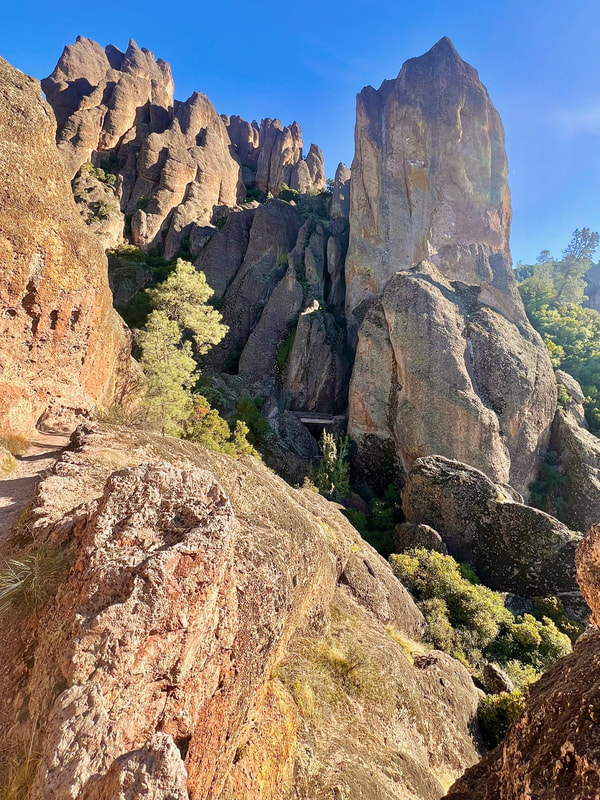
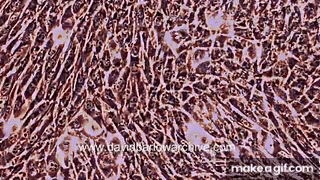
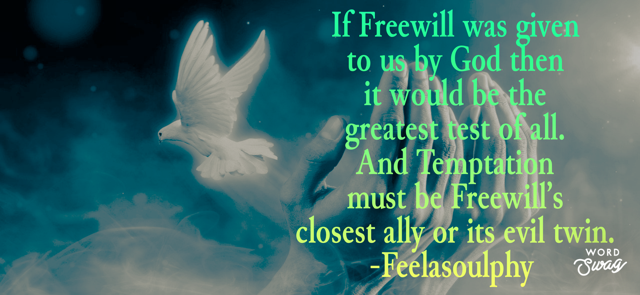
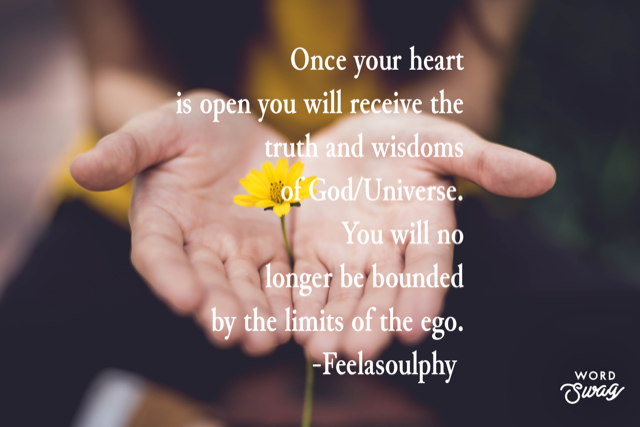
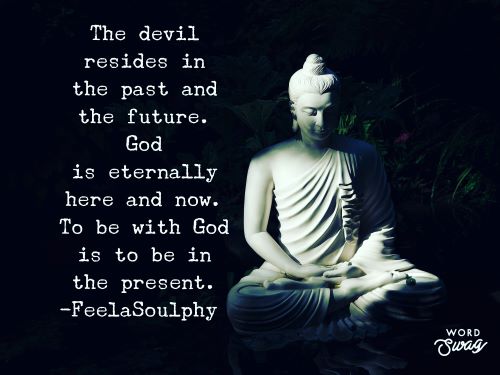
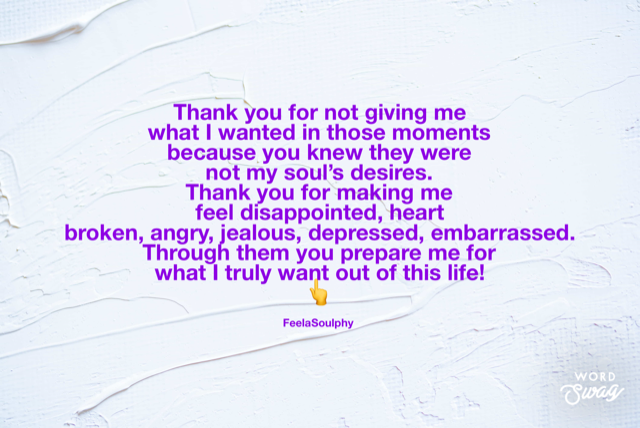

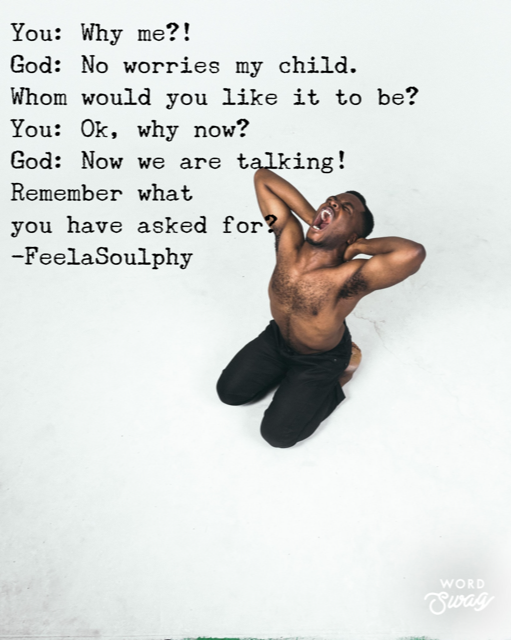
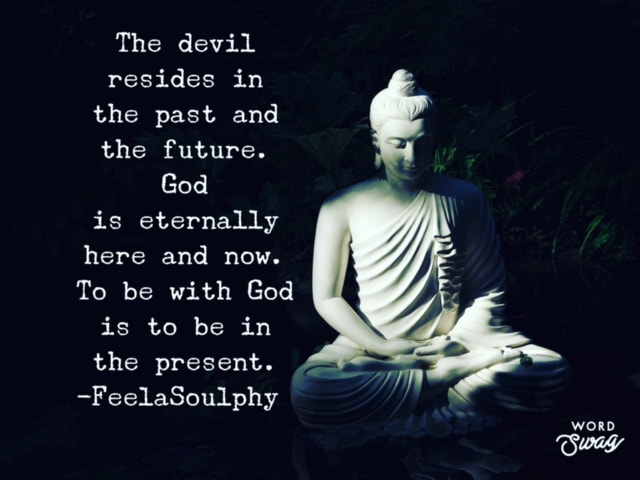
 RSS Feed
RSS Feed